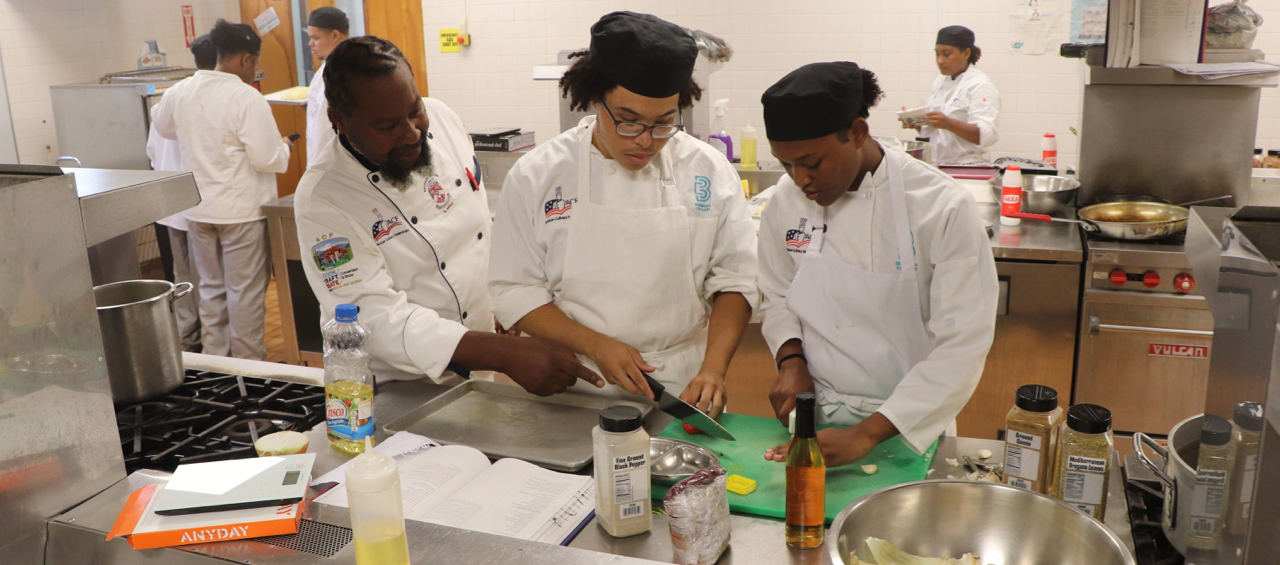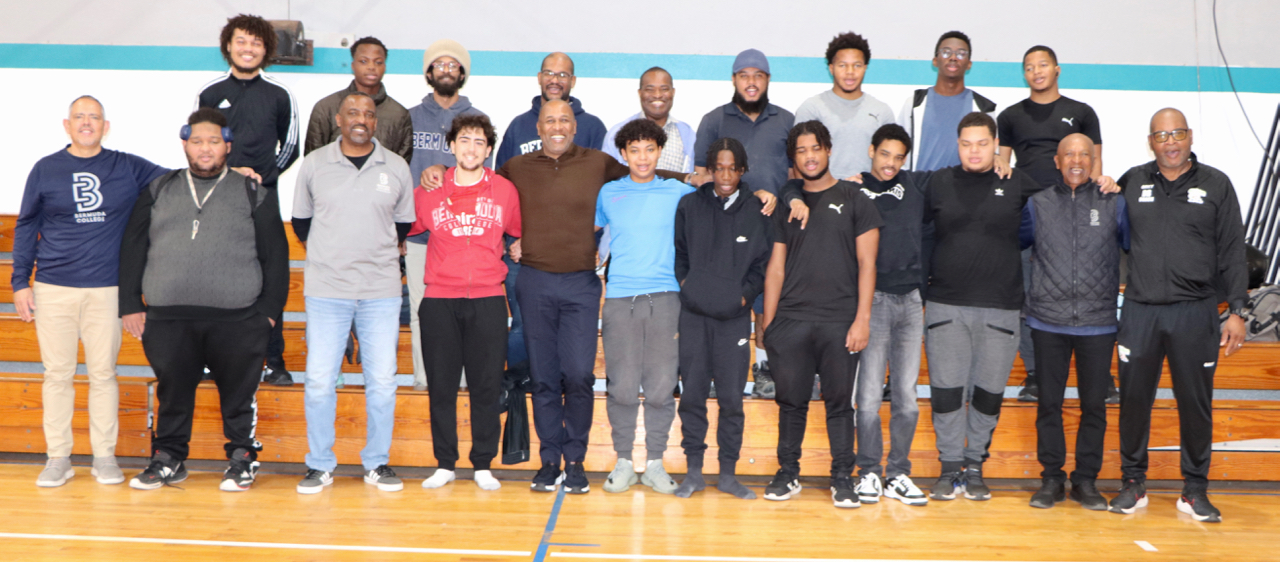Certificate in Wood Technology
Certificate in Wood Technology
This programme has been designed to meet both the needs of the local carpentry industry and the requirements of the National Training Board and the National Centre for Construction Education and Research (NCCER).
Students in the programme can expect to experience practical assignments, lectures and field trips to local building sites and industries. The self-directed activities and supervised assistance will enable students to progress successfully through this programme.
Programme Details
CURRICULUM TOTAL CREDITS: 61
Year 1
First semester - 18 credits
CSC 1100 Learning Strategies for Student Success 1
CSM 1101 Computer Skills Module 2
MAT 0014 Preparatory College Mathematics I 3
or TMM 1001 Technical Math I
ENG 0044 Communications for Industry I 3
WTC 1101 Orientation, Materials, Fasteners, Hand and Power Tools 1
WTC 1102 Floor, Wall, Ceiling and Roof Framing 4
WTC 1103 Windows and Exterior Doors 4
Second semester - 15 credits
ENG 0045 Communications for Industry II 3
MAT 0015 Preparatory College Mathematics II 3
or TMM 1002 Technical Math II
WTC 1104 Reading Plans, Site Layout I; Distance Measurement and Level 3
WTC 1105 Introduction to Concrete, Foundations and Flatwork, Reinforcing Concrete, Handling and Placing 3
WTC 1106 Concrete Forms, Patented Forms, and Tilt-Up Wall Systems 3
Year 2
First semester - 16 credits
TSM 1101 Technical Science I 4
WTC 2107 Exterior Finishing, Roofing Applications, Thermal and Moisture Protection 4
WTC 2108 Framing with Metal Studs, Drywall Installation, Drywall Finishing, Interior Finish II: Suspended Ceilings 4
WTC 2109 Stairs, Interior Finish I, Interior Finish III and Interior Finish IV 4
Second semester - 12 credits
TSM 1102 Technical Science II 4
WTC 2110 Advanced Roof Systems; Advanced Floor Systems and Advanced Wall Systems 4
WTC 2111 Introduction to Light Equipment, Welding and Metal Buildings 1
WTC 2112 Site Layout II – Angular Measurement, Advanced Stair Systems and Introduction to Project Management and Supervision 3
NCCER Core Courses
Basic Safety NCC 1101 1 SP/SM
Complies with OSHA-10 training requirements. Explains the safety obligations of workers, supervisors, and managers to ensure a safe workplace. Discusses the causes and results of accidents and the impact of accident costs. Reviews the role of company policies and OSHA regulations. Introduces common job-site hazards and identifies proper protections. Defines safe work procedures, proper use of personal protective equipment, and working with hazardous chemicals. Identifies other potential construction hazards, including hazardous material exposures, welding and cutting hazards, and confined spaces.
Mathematics NCC 1102 1 SP/SM
Reviews basic mathematical functions such as adding, subtracting, dividing, and multiplying whole numbers, fractions and decimals, and explains their applications to the construction trades. Explains how to use and read various length measurement tools, including standard and metric rulers and tape measures, and the architect’s and engineer’s scales. Explains decimal-fraction conversions and the metric system, using practical examples. Also reviews basic geometry as applied to common shapes and forms.
Hand Tools NCC 1103 1 SP/SM
Introduces trainees to hand tools that are widely used in the construction industry, such as hammers, saws, levels, pullers, and clamps. Explains the specific applications of each tool and shows how to use them properly. Also discusses important safety and maintenance issues related to hand tools.
Power Tools NCC 1104 1 SP/SM
Provides detail descriptions of commonly used power tools, such as drills, saws, grinders, and sanders. Reviews applications, proper use, safety, and maintenance. Many illustrations show power tools used in on-the-job settings.
Introduction to Construction Drawings NCC 1105 1 SP/SM
Familiarises trainees with basic terms for construction drawings, components, and symbols. Explains the different types of drawings (civil, architectural, structural, mechanical, plumbing/piping, electrical, and fire protection) and instructs trainees on how to interpret and use drawing dimensions. Four oversized drawings are included.
Basic Communication Skills NCC 1107 1 SP/SM
Provides trainees with techniques for communicating effectively with co-workers and supervisors. Includes practical examples that emphasise the importance of verbal and written information and instructions on the job. Also discusses effective telephone and e-mail communication skills.
Employability Skills NCC 1108 1 SP/SM
Identifies the roles of individuals and companies in the construction industry. Introduces trainees to critical thinking and problem solving skills and computer systems and their industry applications. Also reviews effective relationship skills, effective self-presentation and key workplace issues such as sexual harassment, stress and substance abuse.
Introduction to Materials Handling NCC 1109 1 SP/SM
Recognises hazards associated with materials handling and explains proper materials handling techniques and procedures. Also introduces materials handling equipment and identifies appropriate equipment for common job-site tasks.
Credit Course Descriptions
Certificate in Plumbing Technology
Certificate in Plumbing Technology
Developed with the assistance of employers in this field, this competency-based, modularised programme usually takes two years to complete. Students will experience lectures, practical assignments and self-directed activities as they progress through the modules, working with an instructor and being evaluated on a skills basis. Graduates will be able to sit the City and Guilds Scheme 6129 examinations and also meet the Bermuda National Training Board and National Centre for Construction Education and Research (NCCER) standards for entering the plumbing trade.
Pre-requisite: NCCER Core (8CR)
Print
Programme Details
CURRICULUM TOTAL CREDITS: 58
Year 1
First semester - 17 credits
CSC 1110 Learning Strategies for Student Success 1
CSM 1101 Computer Skill Module 2
ENG 1044 Communications for Industry I 3
MAT 0014 Preparatory College Mathematics I or 3
TMM 1001 Technical Math I
PLM 1101 Introduction to the Plumbing Profession, Safety and Tools 4
PLM 1102 Plastic Pipe, Copper, Cast Iron, Steel Pipe and Fittings 2
PLM 1103 Fixtures and Faucets, Drain, Waste and Vent Systems, Water Distribution Systems 2
Second semester - 16 credits
MAT 0015 Preparatory College Mathematics II or 3
ENG 1045 Communications for Industry II 3
TMM 1002 Technical Math II
PLM 1104 Commercial Drawings, Hangers and Supports, Installing DWV Piping 4
PLM 1105 Types of Valves, Installing Water Supply Piping, Installing Fixtures and Faucets 3
PLM 1106 Installing Water Heaters, Servicing Fixtures, Valves, and Faucets 3
Year 2
First semester - 13 credits
PLM 2107 Sizing Water Supply Piping, Potable Water Treatment 3
PLM 2108 Backflow Preventers, Types of Venting, Sizing DWV Systems 4
PLM 2109 Sewage Pumps, Compressed Air 2
TSM 1101 Technical Science I 4
Second semester - 12 credits
TSM 1102 Technical Science II 4
PLM 2110 Business Principles for Plumbers, Water Pressure Systems 3
PLM 2111 Codes, Private Water Supply Well Systems 3
PLM 2112 Swimming Pools and Hot Tubs, Plumbing for Mobile Homes 2
NCCER Core Courses
Basic Safety NCC 1101 1 SP/SM
Complies with OSHA-10 training requirements. Explains the safety obligations of workers, supervisors, and managers to ensure a safe workplace. Discusses the causes and results of accidents and the impact of accident costs. Reviews the role of company policies and OSHA regulations. Introduces common job-site hazards and identifies proper protections. Defines safe work procedures, proper use of personal protective equipment, and working with hazardous chemicals. Identifies other potential construction hazards, including hazardous material exposures, welding and cutting hazards, and confined spaces.
Mathematics NCC 1102 1 SP/SM
Reviews basic mathematical functions such as adding, subtracting, dividing, and multiplying whole numbers, fractions and decimals, and explains their applications to the construction trades. Explains how to use and read various length measurement tools, including standard and metric rulers and tape measures, and the architect’s and engineer’s scales. Explains decimal-fraction conversions and the metric system, using practical examples. Also reviews basic geometry as applied to common shapes and forms.
Hand Tools NCC 1103 1 SP/SM
Introduces trainees to hand tools that are widely used in the construction industry, such as hammers, saws, levels, pullers, and clamps. Explains the specific applications of each tool and shows how to use them properly. Also discusses important safety and maintenance issues related to hand tools.
Power Tools NCC 1104 1 SP/SM
Provides detail descriptions of commonly used power tools, such as drills, saws, grinders, and sanders. Reviews applications, proper use, safety, and maintenance. Many illustrations show power tools used in on-the-job settings.
Introduction to Construction Drawings NCC 1105 1 SP/SM
Familiarises trainees with basic terms for construction drawings, components, and symbols. Explains the different types of drawings (civil, architectural, structural, mechanical, plumbing/piping, electrical, and fire protection) and instructs trainees on how to interpret and use drawing dimensions. Four oversized drawings are included.
Basic Communication Skills NCC 1107 1 SP/SM
Provides trainees with techniques for communicating effectively with co-workers and supervisors. Includes practical examples that emphasise the importance of verbal and written information and instructions on the job. Also discusses effective telephone and e-mail communication skills.
Employability Skills NCC 1108 1 SP/SM
Identifies the roles of individuals and companies in the construction industry. Introduces trainees to critical thinking and problem solving skills and computer systems and their industry applications. Also reviews effective relationship skills, effective self-presentation and key workplace issues such as sexual harassment, stress and substance abuse.
Introduction to Materials Handling NCC 1109 1 SP/SM
Recognises hazards associated with materials handling and explains proper materials handling techniques and procedures. Also introduces materials handling equipment and identifies appropriate equipment for common job-site tasks.
Credit Course Descriptions
Certificate in Motor Vehicle Technology
Certificate in Motor Vehicle Technology
The Automotive Technology Certificate programme at the Bermuda College has been developed in partnership with the Automotive Industry and the National Training Board (NTB). The curriculum is designed to meet international and local industry standards with the intent that students be competent to sit the Automotive Service Excellence (A.S.E.) and City & Guilds international certifications. This modularised programme is full-time and takes two years to complete. Students will experience lectures, practical exercises, assignments and self-directed activities as they progress through the modules, working with the lecturer and being evaluated on a skills basis, in addition to industry experience which is compulsory in the second year of the course.
Upon completion, students will be eligible to receive an industry-recognised degree in automotive technology from Bermuda College and enter the automotive industry as a second year apprentice automotive technician.
Pre-requisite: NCCER Core (8CR)
Print
Programme Details
CURRICULUM TOTAL CREDITS: 44
Year 1
First semester - 18 credits
CSC 1100 Learning Strategies for Student Success 1
CSM 1101 Computer Skills Module 2
ENG 0044 Communications for Industry I 3
MAT 0014 or Preparatory College Mathematics I or 3
TMM 1001 Technical Math I
MVT 1104 Electrical Systems 3
MVT 1105 Battery/Charging Systems 3
MVT 1106 Starting Systems 3
Second semester - 12 credits
ENG 0045 Communications for Industry II 3
MAT 0015 or Preparatory College Mathematics II or 3
TMM 1002 Technical Math II
MVT 1101 Ignition Systems 2
MVT 1102 Fuel/Exhaust Systems 2
MVT 1103 Exhaust Emissions Systems 2
Year 2
First semester - 7 credits
MVT 2107 Braking Systems 1
MVT 2108 Hydraulic Brake Systems 1
MVT 2109 Anti-Lock Brake Systems 1
TSM 1101 Technical Science I 4
Second semester - 7 credits
TSM 1102 Technical Science II 4
MVT 2110 Steering Systems 1
MVT 2111 Power Steering Systems 1
MVT 2112 Suspension Systems 1
NCCER Core Courses
Basic Safety NCC 1101 1 SP/SM
Complies with OSHA-10 training requirements. Explains the safety obligations of workers, supervisors, and managers to ensure a safe workplace. Discusses the causes and results of accidents and the impact of accident costs. Reviews the role of company policies and OSHA regulations. Introduces common job-site hazards and identifies proper protections. Defines safe work procedures, proper use of personal protective equipment, and working with hazardous chemicals. Identifies other potential construction hazards, including hazardous material exposures, welding and cutting hazards, and confined spaces.
Mathematics NCC 1102 1 SP/SM
Reviews basic mathematical functions such as adding, subtracting, dividing, and multiplying whole numbers, fractions and decimals, and explains their applications to the construction trades. Explains how to use and read various length measurement tools, including standard and metric rulers and tape measures, and the architect’s and engineer’s scales. Explains decimal-fraction conversions and the metric system, using practical examples. Also reviews basic geometry as applied to common shapes and forms.
Hand Tools NCC 1103 1 SP/SM
Introduces trainees to hand tools that are widely used in the construction industry, such as hammers, saws, levels, pullers, and clamps. Explains the specific applications of each tool and shows how to use them properly. Also discusses important safety and maintenance issues related to hand tools.
Power Tools NCC 1104 1 SP/SM
Provides detail descriptions of commonly used power tools, such as drills, saws, grinders, and sanders. Reviews applications, proper use, safety, and maintenance. Many illustrations show power tools used in on-the-job settings.
Introduction to Construction Drawings NCC 1105 1 SP/SM
Familiarises trainees with basic terms for construction drawings, components, and symbols. Explains the different types of drawings (civil, architectural, structural, mechanical, plumbing/piping, electrical, and fire protection) and instructs trainees on how to interpret and use drawing dimensions. Four oversized drawings are included.
Basic Communication Skills NCC 1107 1 SP/SM
Provides trainees with techniques for communicating effectively with co-workers and supervisors. Includes practical examples that emphasise the importance of verbal and written information and instructions on the job. Also discusses effective telephone and e-mail communication skills.
Employability Skills NCC 1108 1 SP/SM
Identifies the roles of individuals and companies in the construction industry. Introduces trainees to critical thinking and problem solving skills and computer systems and their industry applications. Also reviews effective relationship skills, effective self-presentation and key workplace issues such as sexual harassment, stress and substance abuse.
Introduction to Materials Handling NCC 1109 1 SP/SM
Recognises hazards associated with materials handling and explains proper materials handling techniques and procedures. Also introduces materials handling equipment and identifies appropriate equipment for common job-site tasks.
Credit Course Descriptions
Certificate in Applied Science Technology
Certificate in Applied Science Technology
This programme is designed primarily for students who require technical core subjects to be successful in the various Technical programmes. This unique programme allows students to complete core courses while exploring the various technical disciplines and enhancing their mathematics, science, communication and computer skills.
Print
Programme Details
CURRICULUM TOTAL CREDITS: 50
Year 1
First semester - 13 credits
CSC 1110 Learning Strategies for Student Success 1
TMM 1001 Technical Math I 3
TSM 1101 Technical Science I 4
NCC 1110 Intro to Construction Technology and Trades/Technical Job Skills 5
Second semester - 13 credits
TSM 1102 Technical Science II 4
TEC 1004 Intro to Electricity and Electronics 3
TEC 1006 Intro to Materials and Mechanics 3
ENG 1044 Communications for Industry 3
Year 2
Third semester - 13 credits
TEC 1000 Intro to Computer Aided Technical Drawing 3
TEC 1002 Intro to Programming for Technicians 3
TEC 1010 Intro to Engineering and Design 3
Technical Electives* (choose any 1100-level course from PLM, ELN, MVT, HVA, CIS) 4
Fourth semester - 11 credits
TEC 1020** Capstone Project for Technology and Trades 3
Technical Electives* (choose any 1100-level course from PLM, ELN, MVT, HVA, CIS) 8
*Before taking technical electives one must have satisfactorily completed TMM 1101, TSM 1101,NCC 1110, TEC 1100, ENG 1044
**One must be in the final semester of this programme
Credit Course Descriptions
Certificate in Heating, Ventilation & Air Conditioning Technology
Certificate in Heating, Ventilation & Air Conditioning Technology
Developed with the assistance of employers in this field, this competency-based programme usually takes two years to complete. Students will experience lectures, practical assignments, and self-directed activities as they proceed through the programme working with an instructor and being evaluated on a skills basis. In addition to instruction in the theoretical aspects of Heating, Ventilation and Air Conditioning repair, practical experience is an integral part of the programme.
Graduates will be eligible to receive an industry-recognised certificate in HVAC from the National Centre for Construction Education and Research (NCCER) and also meet the Bermuda National Training Board standard for certification.
Pre-requisite: NCCER Core (8CR)
Print
Programme Details
CURRICULUM TOTAL CREDITS: 59
Year 1
First semester - 14 credits
CSC 1100 Learning Strategies for Student Success 1
ENG 0044 Communications for Industry I 3
MAT 0014 or Preparatory College Mathematics I or 3
TMM 1001 Technical Math I
CSM 1101 Computer Skills Module 2
HVA 1101 Fundamentals of Heating and Cooling 5
Second semester - 16 credits
ENG 0045 Communications for Industry II 3
MAT 0015 or Preparatory College Mathematics II or 3
TMM 1002 Technical Math II
HVA 1102 Mechanical Maintenance 3
HVA 1103 HVAC Controls 3
HVA 1104 Refrigeration System Service 4
Year 2
First semester - 14 credits
HVA 1105 Senior Student Project I 2
HVA 1106 Troubleshooting Heating 3
HVA 2107 Troubleshooting Cooling 3
HVA 2108 Hydronics 2
TSM 1101 Technical Science I 4
Second semester - 15 credits
HVA 2109 Senior Student Project II 2
HVA 2110 System Performance 3
HVA 2111 Energy Management 3
HVA 2112 System Design 3
TSM 1102 Technical Science II 4
NCCER Core Courses
Basic Safety NCC 1101 1 SP/SM
Complies with OSHA-10 training requirements. Explains the safety obligations of workers, supervisors, and managers to ensure a safe workplace. Discusses the causes and results of accidents and the impact of accident costs. Reviews the role of company policies and OSHA regulations. Introduces common job-site hazards and identifies proper protections. Defines safe work procedures, proper use of personal protective equipment, and working with hazardous chemicals. Identifies other potential construction hazards, including hazardous material exposures, welding and cutting hazards, and confined spaces.
Mathematics NCC 1102 1 SP/SM
Reviews basic mathematical functions such as adding, subtracting, dividing, and multiplying whole numbers, fractions and decimals, and explains their applications to the construction trades. Explains how to use and read various length measurement tools, including standard and metric rulers and tape measures, and the architect’s and engineer’s scales. Explains decimal-fraction conversions and the metric system, using practical examples. Also reviews basic geometry as applied to common shapes and forms.
Hand Tools NCC 1103 1 SP/SM
Introduces trainees to hand tools that are widely used in the construction industry, such as hammers, saws, levels, pullers, and clamps. Explains the specific applications of each tool and shows how to use them properly. Also discusses important safety and maintenance issues related to hand tools.
Power Tools NCC 1104 1 SP/SM
Provides detail descriptions of commonly used power tools, such as drills, saws, grinders, and sanders. Reviews applications, proper use, safety, and maintenance. Many illustrations show power tools used in on-the-job settings.
Introduction to Construction Drawings NCC 1105 1 SP/SM
Familiarises trainees with basic terms for construction drawings, components, and symbols. Explains the different types of drawings (civil, architectural, structural, mechanical, plumbing/piping, electrical, and fire protection) and instructs trainees on how to interpret and use drawing dimensions. Four oversized drawings are included.
Basic Communication Skills NCC 1107 1 SP/SM
Provides trainees with techniques for communicating effectively with co-workers and supervisors. Includes practical examples that emphasise the importance of verbal and written information and instructions on the job. Also discusses effective telephone and e-mail communication skills.
Employability Skills NCC 1108 1 SP/SM
Identifies the roles of individuals and companies in the construction industry. Introduces trainees to critical thinking and problem solving skills and computer systems and their industry applications. Also reviews effective relationship skills, effective self-presentation and key workplace issues such as sexual harassment, stress and substance abuse.
Introduction to Materials Handling NCC 1109 1 SP/SM
Recognises hazards associated with materials handling and explains proper materials handling techniques and procedures. Also introduces materials handling equipment and identifies appropriate equipment for common job-site tasks.













